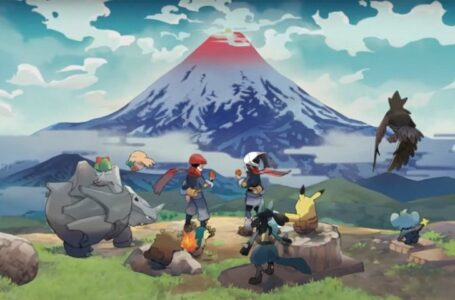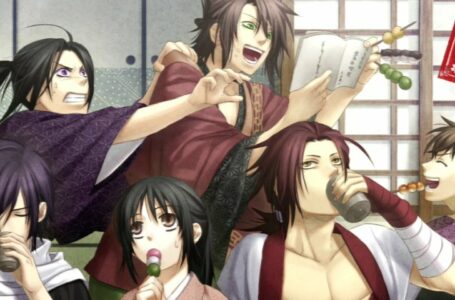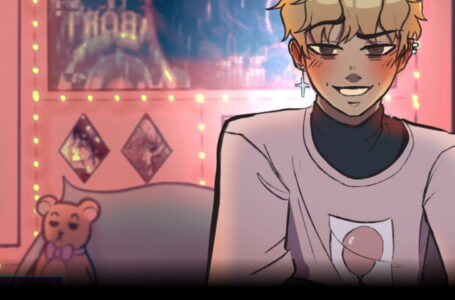Games that make my mental health feel better
It’s already November, and after having bid farewell to a rough 2020, 2021 dealt plenty of us even more blows than we already had experienced beforehand. There’s no sugar-coating it, things can get tough out in the big, wide world, so it’s safe to say that finding slices of happiness is a must, more so now than ever before considering the effects on our mental health both during and post-lockdown.
Here I’ll be covering what video games provide me with positivity when I need it most — and I hope that you can relate to what I have to say, and think about what games you have that give you a mental health safety blanket. We’re in this together, so let’s share our appreciation for the hard-working and inspiring developers out there for giving us these cathartic experiences that make us feel just that bit better about ourselves and our lives.
When you’re feeling insecure
It’s no surprise that I take great enjoyment out of dating sims, and I have previously explored in length why that is the case for its many player benefits. These games can sometimes have a poor reputation among people who don’t “get them”, but the sheer amount of mental health comfort that can be enjoyed by spending time on such games is vast.
Be it for improving one’s social skills, or exploring how to flirt in a secure and supportive environment without consequences — or even freely learn about and understand your sexuality — there are plenty of benefits. But what we are focusing on for today is how they bring me piece of mind and improve my mental health.
While I have my fair share of eroge I take great enjoyment in winding down with, there’s simply nothing more gratifying than seeing a 2D husbando I’ve fallen head over heels for do the exact same thing with me — or rather, the main character. There’s a barrier there with player projection, and while a major point of contention within the genre is how not giving the main character a solid or withstanding personality makes for a doormat of a protagonist, other otomes get it right by giving every single choice and customisable option a chance to make the main character completely and unapologetically “you”.
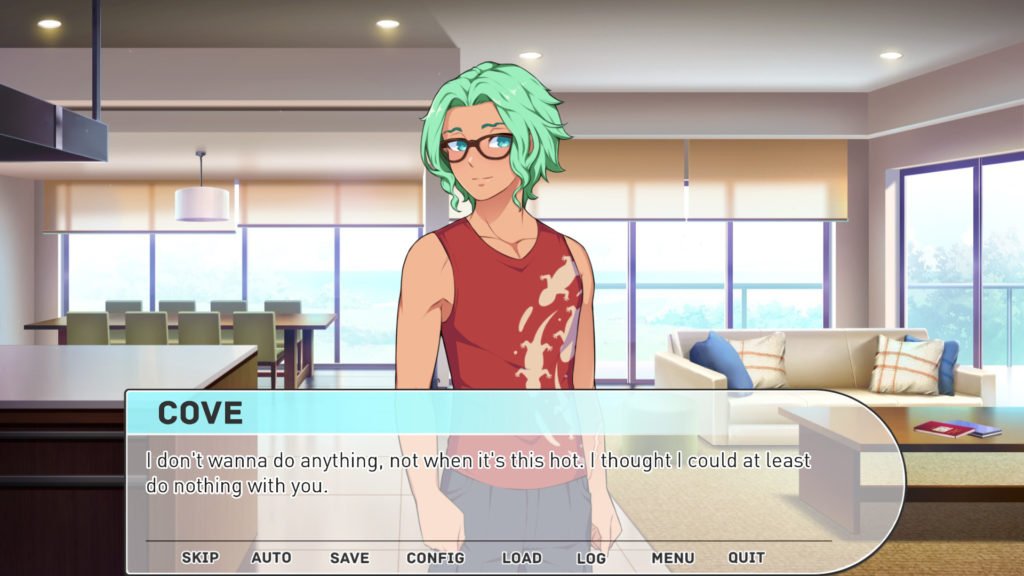
Within the sphere of otome titles, one such example of how a dating sim sympathises and consoles the player is with recent indie gem, Our Life. It’s no surprise that I’ve managed to talk about this mini-masterpiece at length time and time again, but it’s back for a third time as a prime example of a game I play when I’m feeling insecure and need a boost to my mental health.
Otome games in and of themselves are encouraging experiences for feeling validated in that we deserve romance in all our lives, no matter who we are. But Our Life takes this message and does everything in its power, both narratively and mechanically, to inform the player that we are all truly worth the level of intimacy and respect we want.
It does this in a multitude of ways, primarily through its current one and only love interest Cove. He not only accepts the main character for all their traits — right down to their preferences of food, colours and pastimes, as well as their appearance and career goals — but he will love the player platonically or romantically depending on their own wishes.
Cove is absolutely tailored to love the player projection of a completely customisable main character no matter who they are, and it results in a supportive experience that allows the player to truly project themselves onto it to feel fully validated. There are no wrong answers to stumble upon here, and there are no bad consequences found for embracing who you truly are. The perfect boost to your mental health.
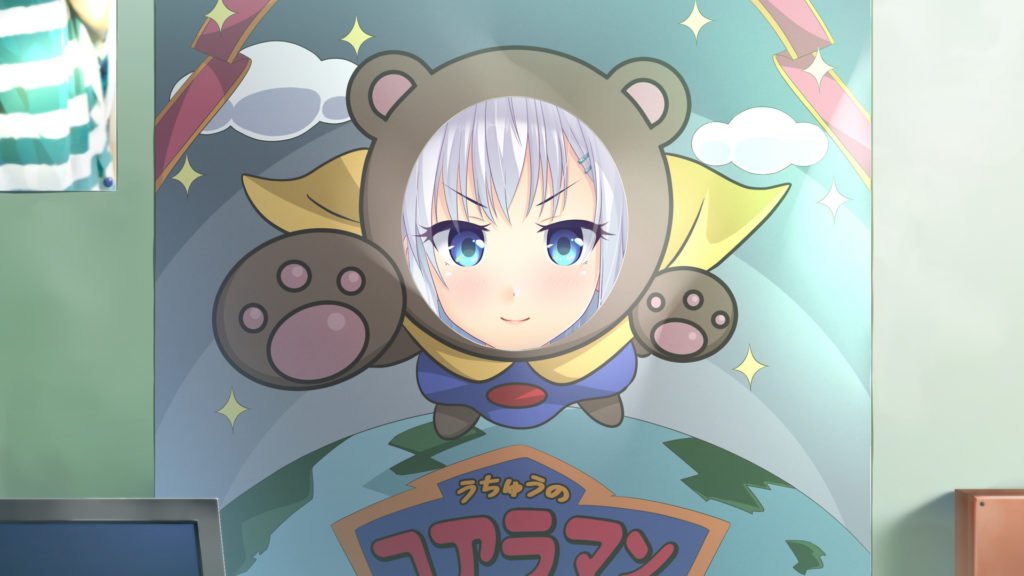
In a less customisable example from the world of eroge, Making*Lovers is a great choice if you’re looking for a visual novel designed to validate the player and their mental health — and a game we haven’t celebrated nearly enough here on Rice Digital before.
As both a comedy and romance, the title balances the two effortlessly, whilst presenting an appealing and relatable premise to every player who is no longer in a school setting. What a treat for us adults! It characters are all employed, for one thing — this alone is noteworthy in the field of romcom visual novels, even if the main character is rather crude and immature.
Moreover, the title manages to get away with having barely any agency with its choices — they actually happen to be quite inconsequential. Instead, Making*Lovers focuses on the progression of the main character and the selected heroine’s bond. In order to illustrate these interpersonal relationships as being the centre of attention, the game’s primary mechanics task the player with impressing their date through choosing appropriate destinations and activities when going out together.
Ultimately, Making*Lovers proves to be a positive and wholesome slice-of-life experience targeting an audience that rarely gets such coverage within the genre, let alone being able to feel so relatable to its premise and characters. And even in the end, our main character who almost always behaves like a big kid does indeed find happiness — oftentimes tying the knot in the endings of the routes. What else could you possibly ask for as the ultimate, encouraging conclusion for a main character most of see a bit of us in? (What are you saying? I’m the very picture of maturity. Peepeepoopoo – Ed.)
When you’re feeling low
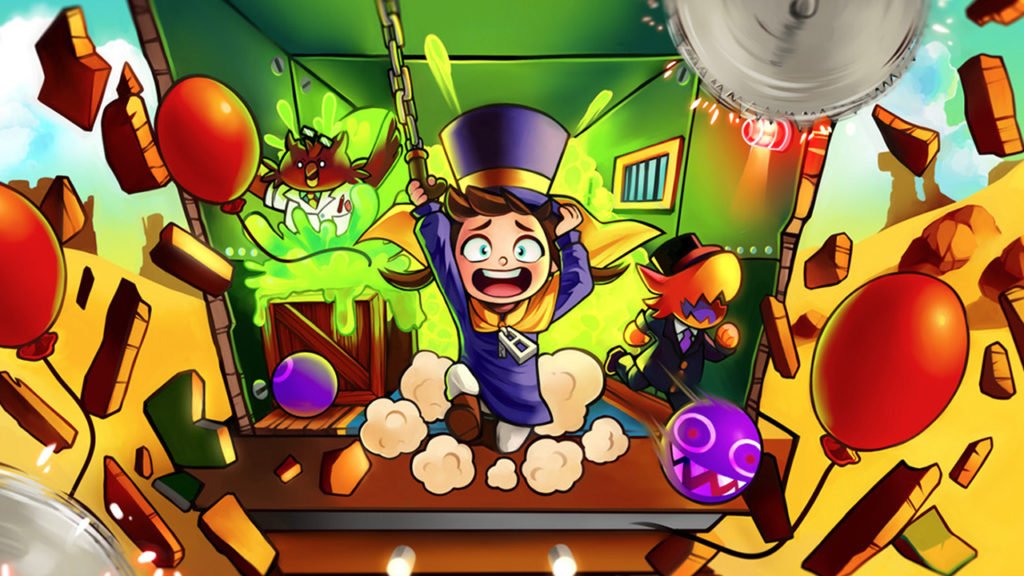
When I need a mental health pick-me-up, I often find myself heading for a platform game. And a particular one at that! A Hat in Time is an experience I’ve spent far too many hours on to have not yet mentioned it before in writing. It contains everything I ever enjoyed about the platforming genre (with past favourites including Spyro the Dragon and Banjo-Kazooie) — and it makes us feel like a kid once again without all the worries that come with adulthood. Sometimes that’s precisely what your mental health wants.
The exploration aspect of finding hidden collectables, the increasingly imaginative world and level designs the more areas you unlock, its cute and always expanding hub world, and the simple fact you can unlock a shooter to dash around on all make for an easy-going and joyful experience I’m still not tired of ever going back to. You can turn your brain off without worries here, and it makes for my greatest escape from reality when I need some much needed uplifting. (Plus The Big Parade is the most addictive piece of video game music ever written – Ed.)
On the opposite end of a game always having something new for me to find, Blooming Panic is, unsurprisingly, another otome game I often seek comfort in ever since it released earlier this year, even though I’ve long since exhausted all the possibilities of the available choices one can make in the game. The reason I keep coming back is simple — its themes and characters are highly relatable.
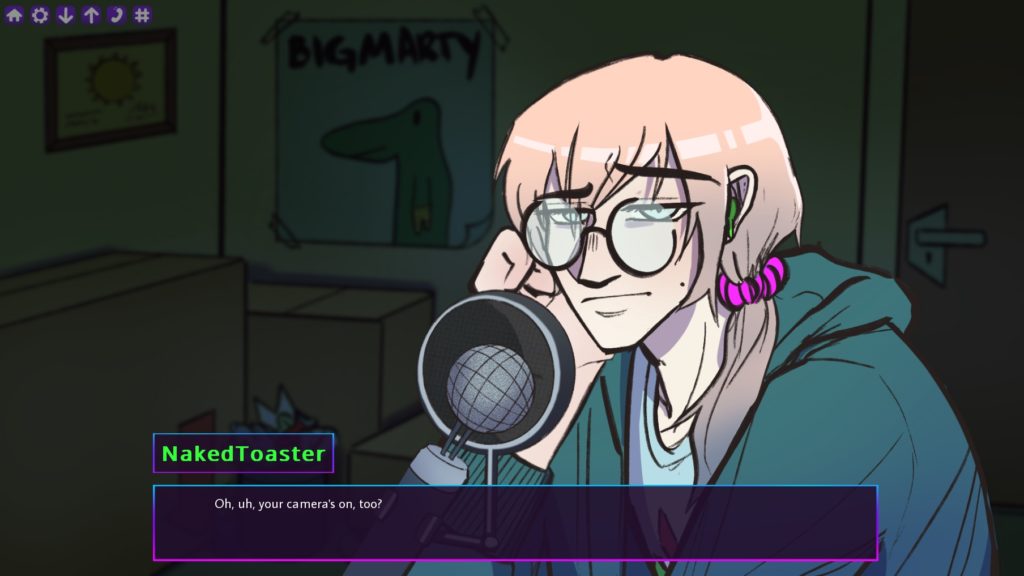
For example, we have Nightowl, the youngster who stays up all night (his username is probably self-explanatory) as he procrastinates instead of getting to his school work. For the right age-group, his personality and narrative will hit the same mental health vulnerabilities many players will be able to sympathise with: the incessant push of parents who expect better from you, the neglect from friends who don’t seem concerned about your wellbeing, and your own sense of self-doubt can all affect and be detrimental to any one of us.
His uncontrolled temper towards the main character is the end result of him bottling up his emotions, and it serves as being a well-executed reminder that simply communicating our thoughts and feelings leads to healthier relationships and overall better mental health: we can see first-hand that Nightowl becomes a better person as a result.
He’s one of three love interests within the game whose mini-arc, considering the understandable shortness of the title as an Otome Jam entry, hits all the right notes — though my personal favourite story and life-lesson in the game comes from Quest. As the so-called but appropriately named “dad of the server”, Quest is its only moderator who also holds down an office job.
His whole character encapsulates a well-intending, caring and considerate guy, as seen by his gentle voice, wise words, and seriousness when it comes to his mod duties; he sincerely wants to keep the server happy and well cared for. Dialogue between him and the main character hints at his mini-story: that of becoming the best version of yourself that you can be, and that no-one stops improving themselves no matter what their background and past is.
So when the server’s opinion of him is flipped because the main character’s ex leaks a mugshot of Quest in their chat, his ideals are challenged. For everything Quest was involved with (minor gang behaviour, don’t worry) in the past, he has become stronger from it, and would not be the stand-up guy he is today without having experienced it. It’s one of the most encouraging and optimistic takes for a otome in regards to how we can do and be better — because in the words of Quest himself, “you’re not defined by the mistakes you made decades ago”.
When you’re feeling lonely and hopeless
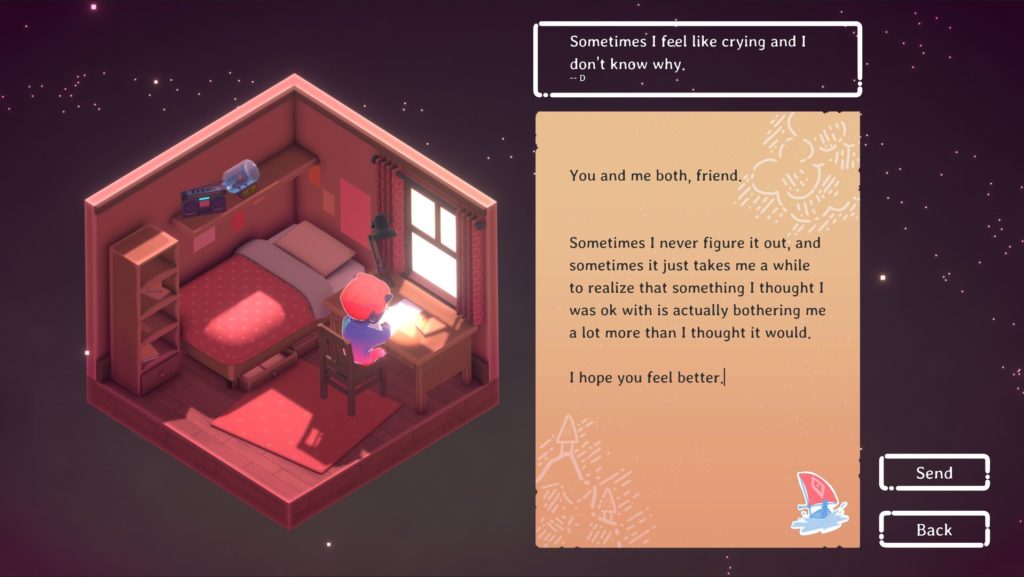
There was only one game that immediately came to mind for this category, and it is one that has stayed near and dear to my heart ever since I thankfully stumbled upon it. Kind Words (lofi chill beats to write to) is an indie game I have already spent an article’s worth of words celebrating its existence, and my praise for it will be everlasting. There is a simple fact that its still quite small but extremely friendly user-base is the anchor to Kind Words, resulting in one of the only online multiplayer games I can safely recommend to find comfort in when you wish to communicate with other fellow gamers. (The opposite of Crab Game, then – Ed.)
Everyone is in the same boat here — and those who aren’t can be reported and are quickly banned — sharing the same goal of seeking guidance and feeling cathartic by writing out your thoughts and worries, no matter how great or small. It’s a voice that will be heard, and acts as a constant reminder that you are never alone — there will always be others who can relate to your situations, thoughts and feelings, and those who are willing to hear you out and lend you a helping hand.
Kind Words soothingly validates the fact that we are all in this together, and better yet gives us a chance to positively affect the life and mental health of someone else. It’s a great experience in both ways: one of showing kindness and care to someone when they may be at their lowest point, and one in which we can safely express ourselves in.
As far as offline and single-player recommendations go, another indie title is one that I spent a mere 20 minutes on a while ago — but in that short time it left an everlasting impression on me.
Off Day is a point-and-click visual novel easily accessible in your own browser which explores the mental health of its main character. Its point-and-click mechanics make up the bulk of its time, with players exploring and selecting the items and aspects of the main character’s house which they deem as “significant”. What makes these objects or throwaway thoughts important to the main character, and by extension, the player? Well, the game answers a simple yet deep question — what is the point of appreciating the little things in life?
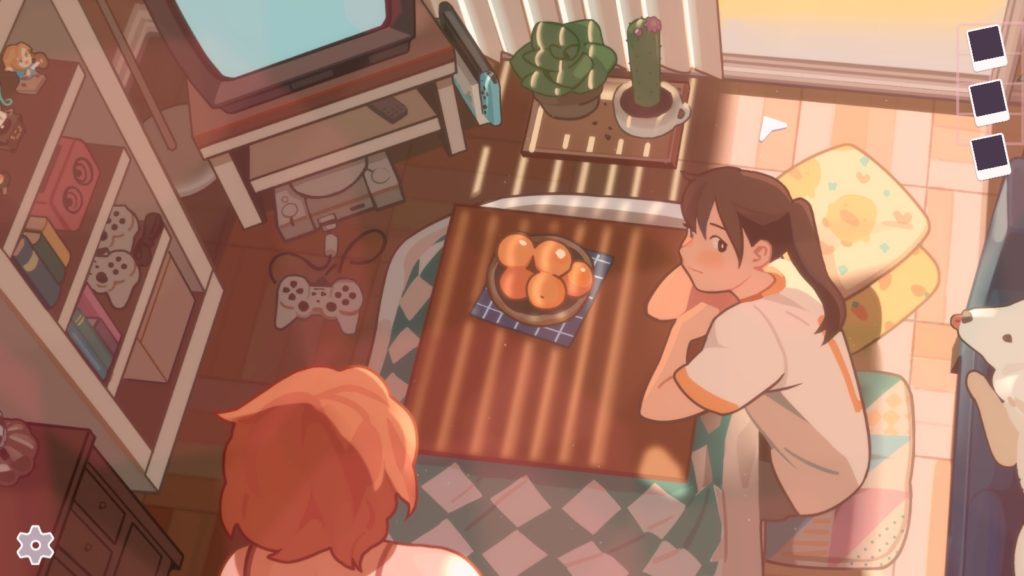
It’s an effective experience that makes me self-reflect on the very things I take for granted, and I especially appreciate the fact that the game released during lockdown, when we were all tackling the issue of maintaining positive mental health. The simplicity of the game and its mechanics — even how a photo is captured when selecting the objects/thoughts you feel most strongly for — represents how each and every aspect we can appreciate within our own world are enduring pieces that represent who we are, keep us tied to our identity, and remind us of the past.
Off Day manages to be so much deeper than anyone would expect for its extremely short runtime, and when the little things aren’t enough despite when the game and ourselves are telling us, it concludes with a reminder that none of us are alone, even in an offline game. If you need to talk to someone, or merely have them lend an ear, there will always be someone available.
And finally, within gaming, the type of video game often tagged as “cosy” has really taken off recently to explore titles that present a cute and calming interface. I say this as a stylistic and aesthetic choice, because many of these examples actually hold much heavier and emotional cores to them. Cozy Grove is centred on bringing life to a haunted island where ghostly bears have lost their way even in the afterlife, and Coffee Talk divulges the daily personal issues of its many different species of characters — all relatable issues such as being overworked and family affairs.
Despite the competition, one game alone rises above and beyond the rest, and it’s probably due to how personally linked I am to the title for releasing in such a turbulent year for me.
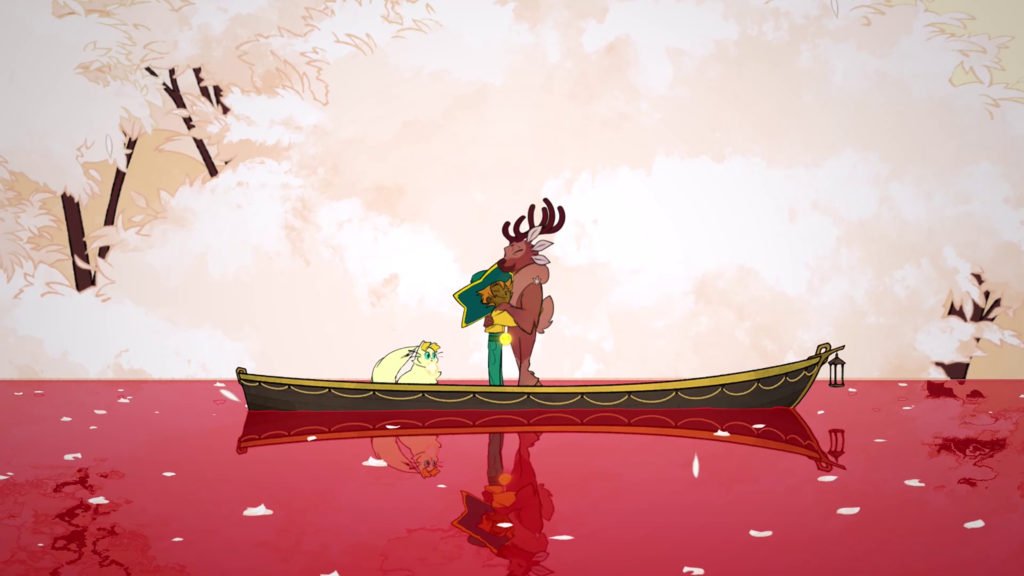
Spiritfarer makes death something not to be feared, but to be accepted. It’s a part of life despite the sadness and pain that comes from it, but what it leaves you with, even in the game’s case, is memories to hold onto, and the knowledge that life should be cherished. Hug someone important to you as many times as you want even if and when it becomes redundant, laugh as many times as you can, and know that crying is a natural way of coping or expressing ourselves.
We are on a journey as much as the game’s main character is; our own voyage may well not be as bright and colourful as the game’s world is, but it’s our personal expedition nonetheless. We can learn to appreciate who comes into our lives, and accept when it is time to let go of them — because through all the emotions that come with being human, every fragment of our memory is one to remember.
Spiritfarer has been the single video game to help me cope with loss this year thanks to its well-timed release on the Switch, and I can’t thank Thunder Lotus Games enough for the emotional comfort it has provided me.
So now it’s your turn, what video game keeps you feeling uplifted and sane?
Join The Discussion
Rice Digital Discord
Rice Digital Twitter
Rice Digital Facebook
Or write us a letter for the Rice Digital Friday Letters Page by clicking here!
Disclosure: Some links in this article may be affiliate links, which means we may earn a small commission if you make a purchase after clicking on them. This is at no additional cost to you and helps support Rice Digital!
- Sigh of the Abyss: Shadow Bonds – Prologue Review - October 7, 2023
- Is She The Wolf? is wickedly addicting TV - October 6, 2023
- The steady consumption of Slow Damage - October 5, 2023




